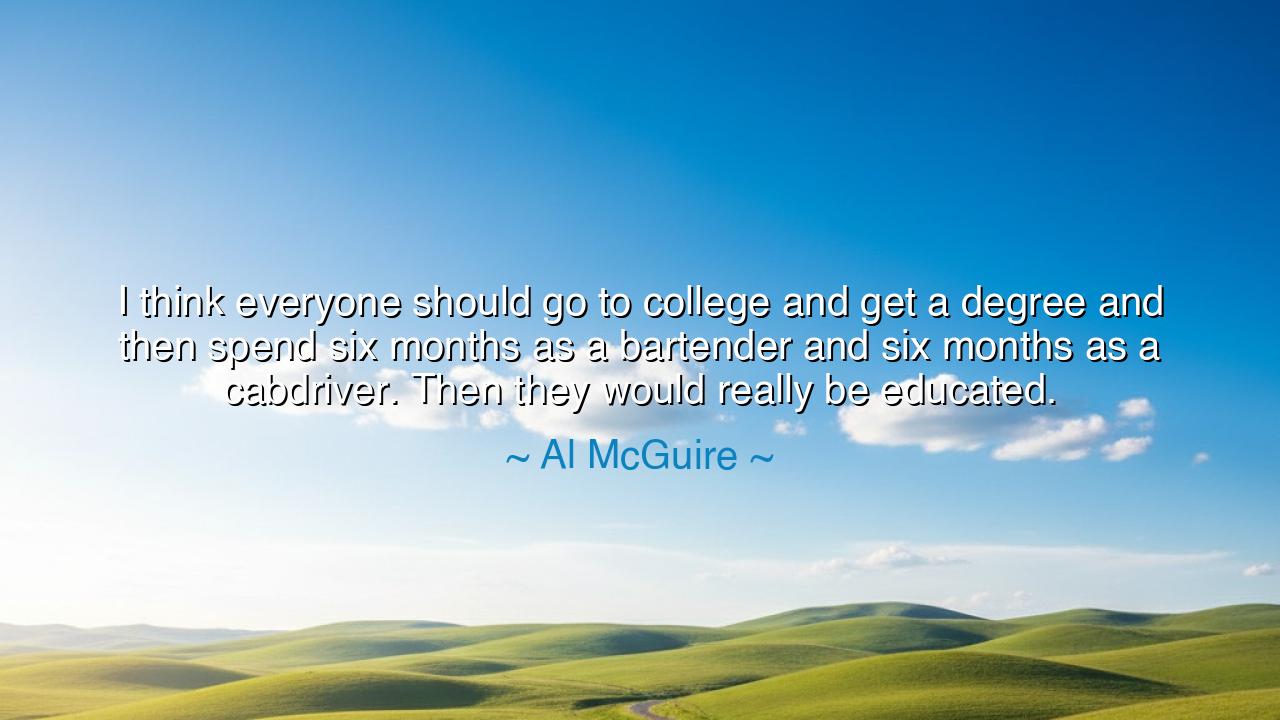
I think everyone should go to college and get a degree and then
I think everyone should go to college and get a degree and then spend six months as a bartender and six months as a cabdriver. Then they would really be educated.






There are sayings that shimmer with humor on the surface but glow with deep truth beneath, and among them is this insight from Al McGuire, the legendary basketball coach and philosopher of the everyday: “I think everyone should go to college and get a degree and then spend six months as a bartender and six months as a cabdriver. Then they would really be educated.” Spoken in jest, perhaps, yet born of wisdom, this statement captures a truth that has echoed through the ages—that education is not only of the mind, but of the heart, and that wisdom does not dwell solely in books, but in the vast and unpredictable classroom of life itself. McGuire, who spent his life both teaching and learning from others, saw that knowledge without understanding of people is like a flame without air—it cannot burn brightly.
To understand McGuire’s meaning, we must first grasp the distinction between knowledge and wisdom. College, he says, gives us the degree—the sharpening of intellect, the discipline of study, the beauty of ideas. Yet it is the bartender and the cabdriver who give us something far rarer: insight into the human soul. The bartender listens to confessions poured between sips of liquor; he learns the secrets of sorrow and joy, the quiet desperation and small victories of ordinary lives. The cabdriver, steering through crowded streets, hears countless stories from strangers in fleeting moments—glimpses of love, fear, ambition, and regret. In those six months behind the bar and six behind the wheel, one learns more about the human condition than a thousand lectures could ever teach. Thus, McGuire’s “real education” is not in formulas or theories, but in empathy, patience, and understanding.
The origin of this quote lies in McGuire’s own life. Born into modest means, he was not just a coach but a philosopher of the streets. He coached young men not merely to win games, but to live well—to respect others, to face hardship with humor, and to find grace in imperfection. His years in locker rooms and cities taught him that life’s greatest lessons come not from privilege, but from proximity—from standing shoulder to shoulder with humanity in all its struggle and beauty. In saying that every scholar should be a bartender and a cabdriver, he reminds us that true education is a union of intellect and compassion, of theory and experience, of the mind that learns and the heart that listens.
History offers countless examples of this truth. Consider Abraham Lincoln, who never attended college, yet whose education was drawn from life itself. He studied law not in a university but by candlelight, and his wisdom was honed not in classrooms but in conversation—with farmers, soldiers, and travelers on dusty roads. He listened, observed, and absorbed. His speeches bore the rhythm of the people because he had lived among them. Lincoln’s greatness came not from scholarship alone, but from understanding the human soul, much like the bartender and cabdriver McGuire spoke of. His education was written not on paper, but upon the heart.
McGuire’s words strike against a modern arrogance—the belief that education is complete once the diploma is framed. He reminds us that a degree may open doors, but it does not open hearts. A person may hold all the knowledge of the world and yet be blind to the struggles of the man beside him. In the bar and in the taxi, there are no titles or ranks—only people, stripped of pretense, speaking their truths. It is there that we learn humility, compassion, and the sacred art of listening. The true scholar is not the one who knows everything, but the one who never stops learning—from every stranger, every sorrow, every smile.
There is also a deeper challenge in McGuire’s humor: to balance the education of the mind with the education of the soul. The first teaches us how to think; the second teaches us how to live. The first measures success in achievement; the second, in understanding. To tend bar is to witness the fragility of hope; to drive a cab is to see the resilience of the human spirit. And when these two forms of learning—academic and human—are joined, a person becomes not only intelligent, but wise; not only capable, but compassionate.
The lesson, then, is as enduring as it is simple: Seek knowledge, but do not forget life. Study deeply, but also live deeply. Listen to people, not only to professors. Learn the ways of the world, not just the words of the wise. Walk where life is unvarnished, where laughter and pain meet in the same breath. For it is there, among the ordinary and the overlooked, that the extraordinary truths of existence reveal themselves.
So, when Al McGuire said that a true education includes six months as a bartender and six as a cabdriver, he was not dismissing universities—he was completing them. He was reminding us that the real degree is not a parchment, but a perspective: the ability to understand and love the world as it is. For the educated mind without a compassionate heart is clever but cold; yet the heart that listens, learns, and connects—ah, that is what makes one truly wise, and truly human.






AAdministratorAdministrator
Welcome, honored guests. Please leave a comment, we will respond soon